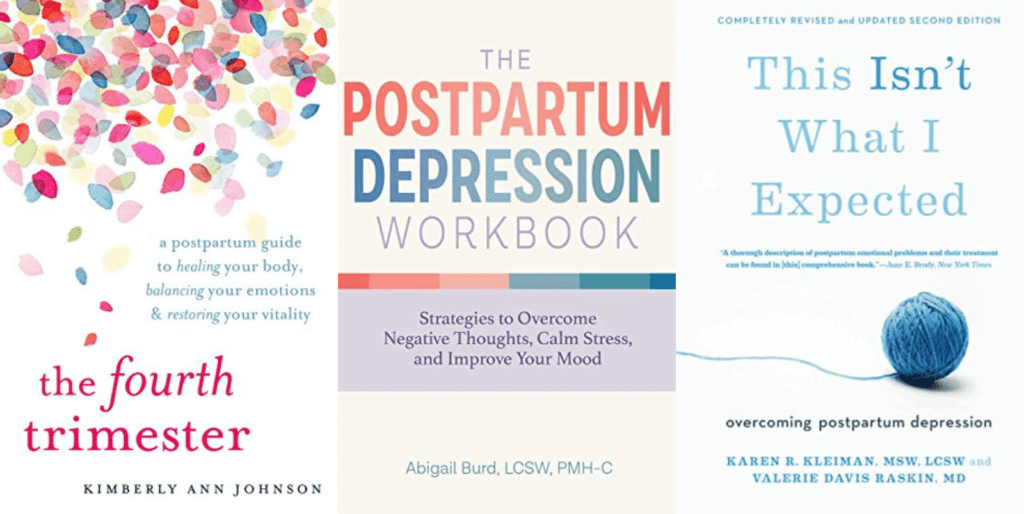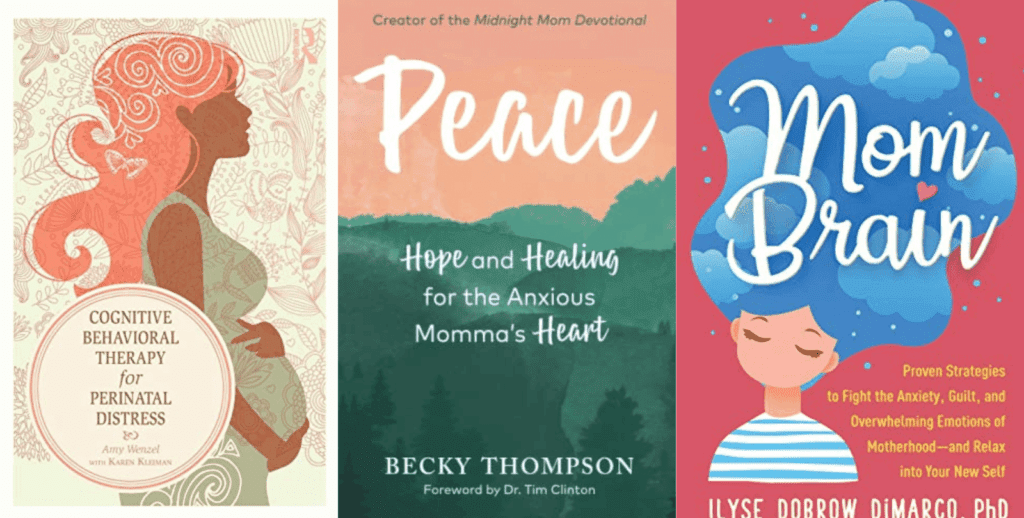The following are some of the best postpartum books.
Disclosure: Some of the links below are affiliate links. This means that, at zero cost to you, I will earn an affiliate commission if you click through the link and finalize a purchase.
What Is Postpartum?
Postpartum refers to the period following childbirth, typically lasting about six weeks. It is also commonly known as the postpartum period or the fourth trimester.
During this time, a woman experiences physical and emotional changes as her body recovers from pregnancy and childbirth.
It is a critical time for both the mother and the baby as they adapt to their new roles and bond with each other.
It is important for new mothers to prioritize self-care and seek support from loved ones and healthcare professionals if needed.
Best Postpartum Books

1. The First Forty Days
By Heng Ou, Amely Greeven, Marisa Belger
The first 40 days after the birth of a child offer an essential and fleeting period of rest and recovery for the new mother. As modern mothers are pushed to prematurely “bounce back” after delivering their babies and are often left alone to face the physical and emotional challenges of this new stage of their lives, The First Forty Days provides a lifeline—a source of connection, nourishment, and guidance.
The book includes 60 simple recipes for healing soups, replenishing meals and snacks, and calming and lactation-boosting teas, all formulated to support the unique needs of the new mother. In addition to the recipes, this warm and encouraging guide offers advice on arranging a system of help during the postpartum period, navigating relationship challenges, and honoring the significance of pregnancy and birth.
Related: Postpartum Anxiety Quiz (+ 5 Tips On Overcoming PPA)

2. The Fourth Trimester
By Kimberly Ann Johnson
Kimberly Ann Johnson draws from her vast professional experience as a doula, postpartum consultant, yoga teacher, body worker, and women’s health care advocate, and from the healing traditions of Ayurveda, traditional Chinese medicine, and herbalism—as well as her own personal experience—to cover
• how you can prepare your body for birth;
• how you can organize yourself and your household for the best possible transition to motherhood;
• simple practices and home remedies to facilitate healing and restore energy;
• how to strengthen relationships and aid the return to sex;
• learning to exercise safely postpartum;
• carrying your baby with comfort;
• exploring the complex and often conflicting emotions that arise postpartum;
• and much more.

3. The Pregnancy and Postpartum Anxiety Workbook
By Pamela S. Wiegartz, Kevin L. Gyoerkoe
The Pregnancy and Postpartum Anxiety Workbook offers powerful strategies grounded in evidence-based cognitive behavioral therapy (CBT) to help you control your worry, panic, and anxiety.
Through a series of simple exercises and worksheets, you’ll learn skills for relaxing yourself when you feel the most stressed. You’ll also learn strategies that are proven-effective in reducing the frequency and intensity of anxious feelings many pregnant women and mothers of infants face. The book also includes a chapter that offers tips to help fathers understand and support their partners.
Related: Postpartum Depression Resources (Information, Podcasts, Books)

4. The Postpartum Depression Workbook
By Abigail Burd LCSW PMH-C
This depression workbook includes:
- Primer on PPD—Discover if you might have PPD, take a look at common causes and risk factors, and see how PPD can impact your partner.
- Lasting relief—The CBT-based postpartum strategies in this depression workbook will help you adopt a positive mindset, improve your mood, deepen your relationships, and find time to recharge.
- Parents like you—Find kinship in real-life scenarios from other parents, paired with practical advice, simple tips, and interactive exercises.
Related: Resources For Depression (Information, APPS, Podcasts, Books)

5. This Isn’t What I Expected
By Karen R. Kleiman, Valerie Davis Raskin MD
This proven self-help program, which can be used alone or with a support group or therapist, will help you monitor each phase of illness, recognize when you need professional help, cope with daily life, and recover with new strength and confidence. Learn how to:
- Identify the symptoms of PPD and distinguish it from “baby blues”
- Deal with panic attacks, obsessive-compulsive urges, and stress overload
- Break the cycle of shame and negative thoughts
- Mobilize support from your husband or partner, family, and friends
- Seek and evaluate treatment options
- Cope with the disappointment and loss of self-esteem
Related: Journal Prompts For Depression (+FREE Depression Worksheets PDF)

6. Good Moms Have Scary Thoughts
By Karen Kleiman
Good Mothers Have Scary Thoughts is packed with world-class guidance, simple exercises, and nearly 50 stigma-busting cartoons from the viral #speakthesecret campaign that help new moms validate their feelings, share their fears, and start feeling better. Lighthearted yet serious, warm yet not sugary, and perfectly portioned for busy moms with full plates, Good Moms Have Scary Thoughtsis the go-to resource for moms, partners, and families everywhere who need help with this difficult period.
Related: Journal Prompts For Anxiety (+FREE Anxiety Worksheets)

7. Natural Health after Birth
By Aviva Jill Romm
This book provides support both for women who plan to be home full or part time during the first year and those who must return to their jobs soon after the birth. With humor and compassion, Romm offers mothers practical wisdom for attaining the delicate balance between being fully immersed in the beautiful but demanding path of motherhood and maintaining a sense of self.
Related: Top 10 Practical CBT Exercises For Generalized Anxiety Disorder Relief

8. The Postpartum Husband
By Karen R. Kleiman
This hands-on guide includes straightforward, supportive information and specific recommendations to help partners deal with the impact of depression after the birth of a baby.
Related: How To Stop Self-Critical Thoughts Using These Top 10 Techniques

9. The Mother-to-Mother Postpartum Depression Support Book
By Sandra Poulin
What kind of mother, some might wonder, could feel depressed after having been so richly blessed with a baby? The answer: every kind, women from all walks of life, from all over the world, younger and older. And here, in a unique collection, are their stories of battles with PPD, with intimate details about the symptoms, the struggles, and the strategies that helped them emerge victorious.
Related: Best 10 Postpartum Books

10. Self-Care for New Moms
By Corinne Crossley
Written from the perspectives of both therapist and busy mom, Self-Care for New Moms features several eye-opening exercises, interviews from a village of experts (who also happen to be moms), and helpful interventions to help you get through the chronic depletion common to the postpartum year.
Related: Best 10 Intrusive Thoughts Books

How Postpartum Books Can Help
Postpartum books can be incredibly helpful for new parents as they provide valuable information, support, and guidance during the postpartum period.
Here are a few ways in which postpartum books can help:
1. Education: Postpartum books offer a wealth of information about what to expect after giving birth. They cover topics such as physical recovery, emotional changes, breastfeeding, sleep deprivation, and baby care. By reading these books, parents can gain a better understanding of what is happening to their bodies and emotions, which can alleviate anxiety and provide reassurance.
2. Support: The postpartum period can be challenging, and it’s common for parents to feel overwhelmed or isolated. Postpartum books offer a sense of companionship and let you know that you’re not alone in your experiences. They provide relatable stories from other parents who have gone through similar situations, offering comfort and encouragement.
3. Practical advice: Postpartum books often share practical tips and techniques for taking care of yourself and your baby. They may provide guidance on topics such as postpartum self-care, managing the demands of parenting, establishing routines, and coping with sleep deprivation. These books can help parents feel more equipped to handle the day-to-day challenges and make informed decisions.
4. Mental health support: The postpartum period can also bring about changes in mental health, such as postpartum depression or anxiety. Many postpartum books address these issues, providing strategies for recognizing symptoms and seeking help. By reading about others’ experiences and learning coping mechanisms, parents can feel empowered to prioritize their mental well-being.
5. Relationship guidance: Having a new baby can put a strain on relationships, as parents navigate their roles as caregivers while also maintaining their partnership. Postpartum books often offer insights and advice on how to nurture your relationship amidst the challenges of raising a child. They may suggest communication techniques, date night ideas, or ways to support each other during this transitional time.
Conclusion
Avery parent’s experience is unique, and not all advice from postpartum books will resonate with everyone.
However, these postpartum books can serve as a valuable resource, helping parents feel informed, supported, and empowered as they navigate the postpartum journey.


